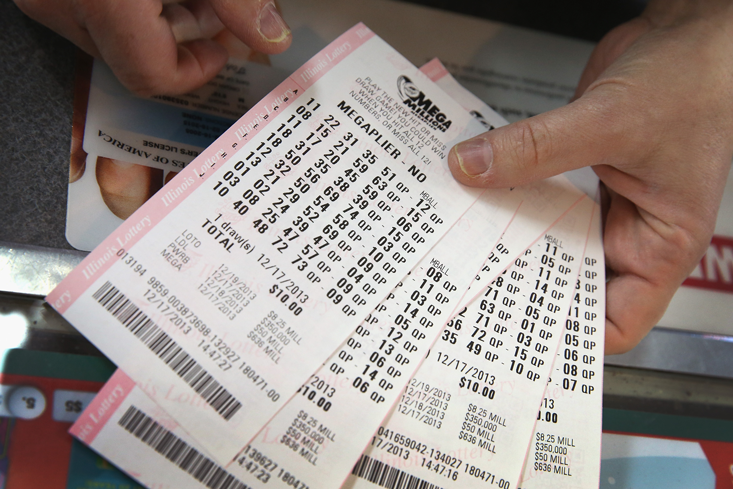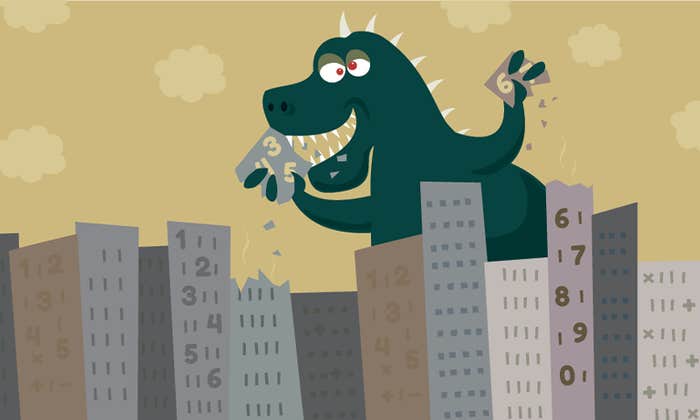A woman named Ann Hodges was at her home in Sylacauga, Alabama, one day in 1954, napping on the couch under a big quilt, when a hunk of black rock crashed through the ceiling and hit her on the thigh. With that (unlucky) burst from the sky, she became the only confirmed person in history to have been hit by a meteorite.
You probably shouldn’t spend a lot of time worrying about meteorite strikes since “it’s more likely you get hit by a tornado and a bolt of lightning and a hurricane all at the same time,” Florida State College astronomer Michael Reynolds said about that remarkable hit. And yet we do worry. Scientists say an asteroid that smashed into the earth 66 million years ago led to a change in climate that caused the extinction of the dinosaurs. It was long ago and rare, but who knows—if there’s an asteroid strike every 66 million years, another may be due tomorrow.

We’ve all had situations that seem like crazy coincidence—you’re traveling in a remote location and run into someone you know, or an old friend from college calls just as you’re thinking about her. Your reaction is probably, Amazing! What are the odds?
And it turns out the odds can be very different than you expect.
The random and unlikely keep us enthralled—at least in part because they can turn life and expectations so dramatically upside down. There are 7 billion people on the planet—so even if something is a million-in-one shot, it will happen to 7,000 of us. That’s a lot of bolts from the blue.
Impossible odds don’t mean something is impossible. In 2016, the English football club Leicester City was given a 5,000–1 chance of winning the championship of the Premier League. For some perspective, bookmakers gave the same odds to Bono becoming the next pope. Essentially those odds mean Are you crazy? It’s not going to happen.
However long the odds, if you want to make luck happen, you don’t quit. Something can happen.
The Premier League is big and powerful, with no draft or salary caps, and the same four teams have won the championship for the previous 20 years. Little underfunded Leicester City had lost so many games the previous season that they barely escaped being tossed out of the league altogether. The closest they had come to a championship was finishing second in the 1928–29 season. They spent about a tenth as much on their players as the more popular teams like Manchester United and Arsenal.
But with all that, they won. One way to think of 5,000–1 odds is that if the teams in the Premier League played for 5,000 years, Leicester City would win the title once. The BBC called it “one of the greatest sporting stories of all time.” Closer to home, NBC Sports said, “It’s not like anything we can comprehend in America.” Others noted that during spring training in America, even the worst baseball teams are given 500–1 (or so) odds of winning the World Series. Leicester City was considered 10 times worse than the worst.
But the funny thing is that after the win, various pundits had explanations for why it all happened. They praised the analytics the team used in recruiting and signing players, pointed to the surprising coach, and noted that the famous four top teams all sputtered. Had the players on Leicester City made their luck (as the first two explanations would suggest), or was it simply that year 5,000 comes around if you wait long enough? I certainly don’t know enough about English football to say—but it’s definitely easier to explain an event after it occurs than before.
However you cast it, the Leicester City story is inspiring even to those who don’t know that English football is really the same as American soccer. However long the odds, if you want to make luck happen, you don’t quit. Something can happen. You can change the odds. You can surprise yourself and everyone else.
There’s a parable about two rulers who are rolling the dice to see who will control the world. The first rolls, and each die lands with a six on its face—a total of 12 is as good as it can be.
“I win. You can give up,” he tells his opponent.
But the other leader insists on his turn. When he rolls the dice, one lands on a six and the other breaks into two pieces—with half showing a six and the other half a one. So he got a 13. What are the odds? You don’t actually know the best that can be done unless and until you keep trying to do it. You could end up being surprised by outcomes beyond what you originally considered.
“By changing or eliminating certain risk factors, you can change your chances, or luck.”
Barnaby Marsh, a visiting scholar at the Institute for Advanced Study in Princeton, New Jersey, has spent years of his academic career studying risk, and when I brought up the question of odds with him, he pointed out that one way to beat the odds is to personalize them.
“Pick the statistic you want to be,” he told me.
“What does that mean?” I asked.
We were having breakfast at a local cafe, and I glanced over at the banana bread on the table, trying to decide if I should have a piece. Barnaby caught my gaze and smiled as he picked his example.
“Think of it this way. Statistics now say that about a third of Americans are obese. But that doesn’t mean every individual has a one-in-three chance of being too fat. You can decide what you’re going to eat and how much you’ll exercise, and that will affect your weight. You get to decide which statistic you’re in.”
“So I shouldn’t have the banana bread,” I said with a sigh.
Barnaby laughed. “It’s not really a problem for you. And that’s the point. Saying there’s a 30 percent chance of being obese is one thing. Saying that you—whoever you are—have that probability is very different.”
I ate the banana bread. And since the topic intrigued me, I did a little more research later and found out that Barnaby was completely right. Most studies show that genetic factors play only a small part in obesity, and lifestyle is more important than anything else. Research out of the Harvard School of Public Health shows that even if you have the genes associated with obesity, what you eat and how much you exercise will have a greater influence on your shape than your genetics. Where you live has a role in obesity, too. In some states (topped by Alabama), obesity is over 35 percent, while in Colorado, the perennially leanest state, it’s more like 20 percent. But if you live in one of the fattest states and eat fruit and vegetables and go for daily runs, you’ll easily beat the odds. In fact, the overall odds won’t apply to you at all.

As we continued with our breakfast discussion of risk and statistics, Barnaby surprised me by telling me that when his first daughter, Mandarin, was born, he wanted her to share the bed with her parents. His wife, Michelle, thought it was a terrible idea. She told Barnaby that co-sleeping babies are five times more likely to die than those who are put safely in their own cribs. Some are crushed when parents roll over on them, and others suffocate in sheets and blankets or get wedged in the sides of beds. There is also a clear connection between the devastation of sudden infant death syndrome (SIDS) and co-sleeping. One comprehensive review showed that 69 percent of babies who died of SIDS slept in their parents’ bed. The statistics were pretty clear—the safest place for a baby is in a crib.
“But babies all over the world have traditionally slept with their mothers, and I felt there would be benefits for nursing and other considerations. So I took another look at the statistics,” Barnaby said.
He found that many of the risks of co-sleeping occurred when parents were intoxicated or obese or had lower education levels. Another key problem involved sleeping on a soft surface—a couch, waterbed, or squishy mattress—and having an excess number of blankets. None of those factors applied in the case of his family.
“So I calculated that the standard reference statistic being used of a one in a thousand risk was probably much lower for us,” Barnaby said. “By changing or eliminating certain risk factors, you can shift the risk curve—and effectively change your chances, or luck.”
Mandarin snuggled next to Mom and Dad for a year, and so did baby Jasmine when she arrived. Both girls are fine and beautiful and thriving. A lot of people might disagree with his decision on co-sleeping while others wildly support it—the topic remains controversial—but the bigger issue is an important one.
“We can’t remove all risks, and life is always about tradeoffs,” Barnaby said. He pointed out that there are statistical risks involved with taking the kids out anytime in the car—but we do it anyway.
“What’s important is that you understand the reality of the risks you’re taking.”
Mark Twain popularized the expression “lies, damned lies, and statistics,” and it’s very easy to get swayed by experts tossing around numbers—or encouraging you to misinterpret them. If you hear a report (usually from a doctor on TV) that eating kale or running 10 miles a day reduces your risk of a particular disease by half, it could be that your odds went from .002 to .001. In practical terms, that 50 percent decrease doesn’t mean anything at all. If you like kale, go ahead and make a salad. But don’t expect it to be a major source of luck. Similarly, you can theoretically know that an 80 percent chance of rain predicts what will happen 8 out of 10 times with the meteorological conditions as they are. But all you really care about is whether the baseball game this afternoon is going to be canceled.
If you understand the odds, you can play with them. So, for example, back in 1992, an Australian investor syndicate came up with a strategy for getting lucky in the lottery. Instead of buying just one (or two or three) tickets, they planned to win the Virginia Lottery by buying a ticket for every possible combination. At the time, each of the $1 tickets had six bubbles that could be filled with a number from 1 to 44, which meant there were some 7 million combinations. Filling out all those little forms would take a very long time, so they bought blocks of tickets through more than a hundred different retailers. It kept the stores humming. “No one wants to be in line behind anyone who’s there for three or four days,” said one disgruntled Virginian in a public hearing after the lottery fix. The syndicate managed to get only 5 million of the 7 million combinations before time ran out—but the odds were on their side, and they won the $27 million jackpot.
You probably don’t want to try this at home. Even if you could borrow the money to buy all those tickets, most state lotteries are now dramatically harder to fix. (Having the number of choices go up to 49 instead of 44 may not sound like a big deal, but it doubles the possible combinations to 14 million.) And even if you win, you always run the risk of having to share the big bucks with other ticket holders who (randomly) picked the right combination. In major lotteries, like the national Mega Millions drawings, it would be impossible to print the necessary number of tickets, no matter how many retailers you had on your side. But the Australian investors were right in their general theory: If you increase your chances, you increase your odds.
When I first heard the story of the Virginia Lottery, my thought was Yikes! The syndicate got only 5 million of the 7 million—they could still lose! Barnaby said his thought was—Five out of seven—great odds! That’s the funny thing about statistics and odds—they are just numbers, and we give them our own emotional overlay. As you are making your luck (and living your life), you make very personal decisions on how much risk to take in everything from family to finance.
Janice Kaplan is the former editor-in-chief of Parade magazine, and the author of thirteen popular books including the New York Times bestseller The Gratitude Diaries.
Barnaby Marsh is a Rhodes Scholar at Oxford who did pioneering research on decision making in complex situations. He works with leaders of major corporations, foundations, and philanthropists, and continues academic research at both the Center for Evolutionary Dynamics at Harvard and the Institute for Advanced Study in Princeton.
From How Luck Happens by Janice Kaplan and Barnaby Marsh, published on March 6, 2018 by Dutton, an imprint of Penguin Publishing Group, a division of Penguin Random House, LLC. Copyright © March 6, 2018 by Janice Kaplan and Barnaby Marsh.






























